Sales representatives are the driving force behind a company's revenue generation. They connect with potential clients, understand their needs, and offer solutions that align with the company's products or services.
The skills required for a sales representative include strong communication, active listening, and the ability to build relationships. Additionally, they need to be adept at negotiation, time management, and understanding customer behavior.
Candidates can write these abilities in their resumes, but you can’t verify them without on-the-job Sales Representative skill tests.
In this post, we will explore 9 essential Sales Representative skills, 11 secondary skills and how to assess them so you can make informed hiring decisions.
Table of contents
9 fundamental Sales Representative skills and traits
The best skills for Sales Representatives include Product Knowledge, Communication Skills, Customer Relationship Management, Negotiation Skills, Time Management, Active Listening, Problem-Solving, Adaptability and Tech Savvy.
Let’s dive into the details by examining the 9 essential skills of a Sales Representative.
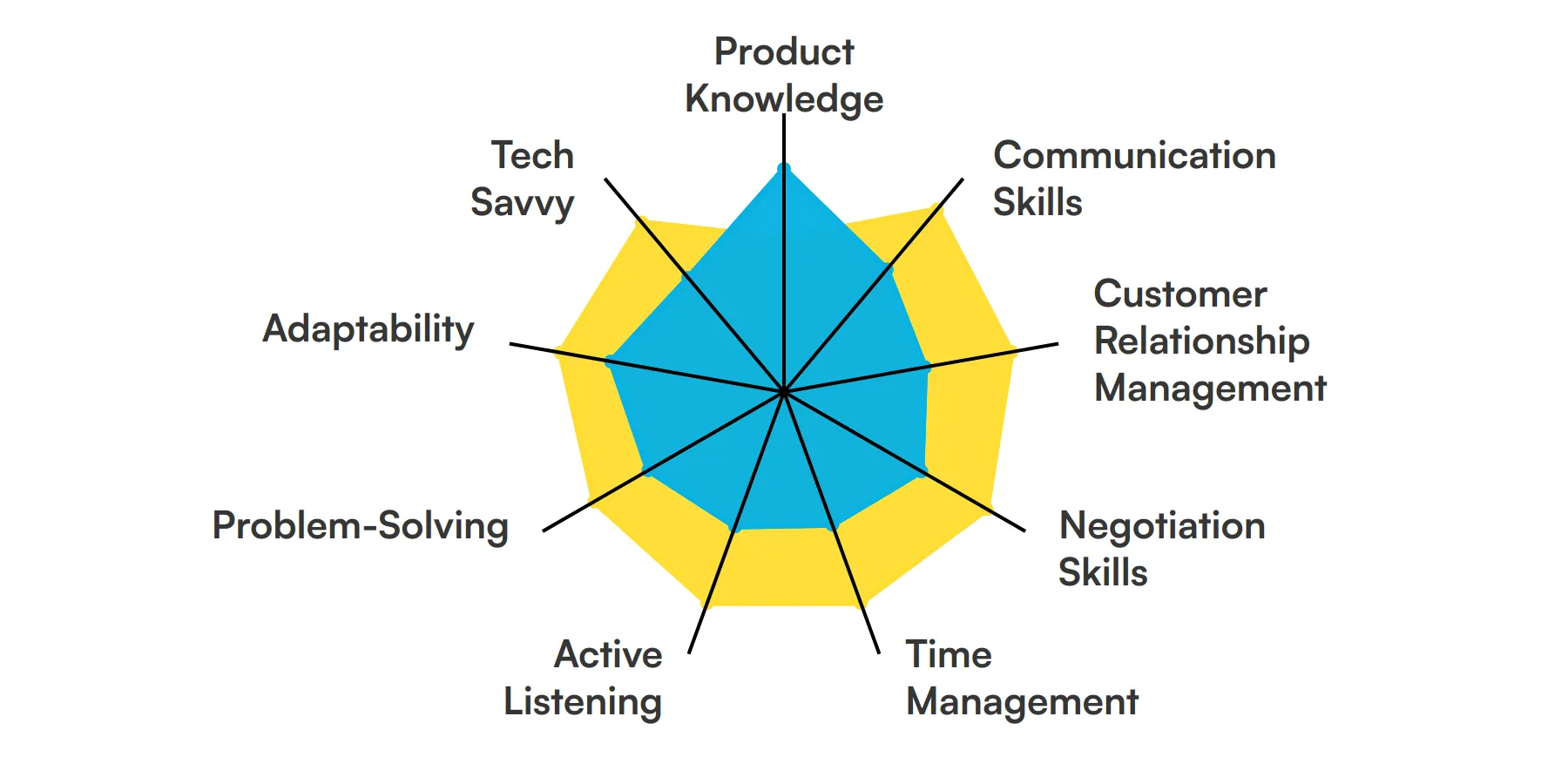
Product Knowledge
A sales representative must have a deep understanding of the product they are selling. This knowledge allows them to answer customer questions, highlight key features, and demonstrate the value of the product effectively.
Communication Skills
Clear and persuasive communication is key for a sales representative. They need to convey information in a way that is easy to understand and compelling, whether they are speaking with clients in person, over the phone, or via email.
Customer Relationship Management
Building and maintaining strong relationships with customers is crucial. A sales representative uses CRM tools to track interactions, follow up on leads, and ensure customer satisfaction over time.
For more insights, check out our guide to writing a CRM Manager Job Description.
Negotiation Skills
Negotiation is a core part of a sales representative's role. They must be able to find a middle ground that satisfies both the customer and the company, ensuring a win-win situation.
Time Management
Managing time effectively allows a sales representative to prioritize tasks, follow up on leads promptly, and meet sales targets. This skill ensures that they can handle multiple clients and tasks without dropping the ball.
Active Listening
Active listening helps a sales representative understand the needs and concerns of their customers. By truly listening, they can tailor their pitch to address specific pain points and build trust.
Problem-Solving
Sales representatives often encounter objections or issues that need quick resolution. Problem-solving skills enable them to think on their feet and provide solutions that satisfy the customer and close the sale.
Adaptability
The ability to adapt to different situations and customer needs is important. A sales representative must be flexible in their approach and ready to adjust their strategy based on the feedback they receive.
Tech Savvy
In today's digital age, being comfortable with technology is a must. Sales representatives use various software tools for CRM, presentations, and communication, making tech-savviness a valuable skill.
11 secondary Sales Representative skills and traits
The best skills for Sales Representatives include Presentation Skills, Networking, Market Research, Emotional Intelligence, Data Analysis, Cold Calling, Follow-Up, Team Collaboration, Public Speaking, Social Media and Writing Skills.
Let’s dive into the details by examining the 11 secondary skills of a Sales Representative.
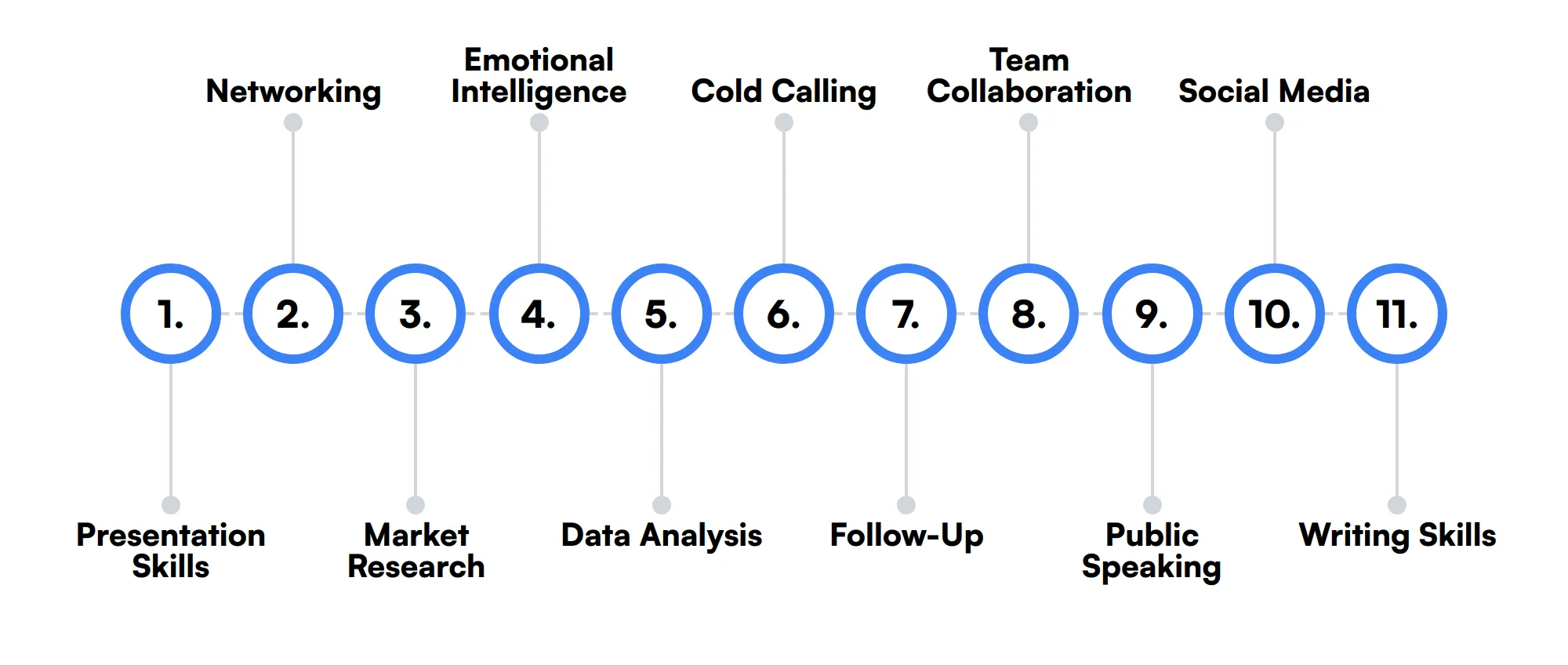
Presentation Skills
Being able to present information clearly and engagingly is beneficial. This skill helps a sales representative make compelling pitches and demonstrations.
Networking
Building a network of contacts can open up new opportunities. A sales representative who is good at networking can leverage these connections to generate leads and referrals.
Market Research
Understanding the market landscape helps in identifying trends and opportunities. A sales representative who conducts market research can better position their product and anticipate customer needs.
Emotional Intelligence
Being aware of and managing one's emotions, as well as understanding others' emotions, can improve interactions. This skill helps a sales representative build rapport and handle difficult situations gracefully.
Data Analysis
Analyzing sales data can provide insights into performance and areas for improvement. A sales representative who can interpret data effectively can make informed decisions to boost sales.
Cold Calling
Reaching out to potential customers who haven't expressed interest yet is a challenging but important task. A sales representative skilled in cold calling can generate new leads and expand the customer base.
Follow-Up
Consistent follow-up is key to closing deals. A sales representative who is diligent about following up can keep the sales process moving and ensure no opportunities are missed.
Team Collaboration
Working well with other team members can enhance overall performance. A sales representative who collaborates effectively can share insights and strategies, leading to better results.
Public Speaking
Being comfortable speaking in front of groups can be an asset. This skill allows a sales representative to deliver presentations and pitches to larger audiences confidently.
Social Media
Leveraging social media platforms can help in reaching a wider audience. A sales representative who is adept at using social media can engage with potential customers and promote their product.
Writing Skills
Clear and persuasive writing is important for crafting emails, proposals, and marketing materials. A sales representative with strong writing skills can communicate effectively in written form.
How to assess Sales Representative skills and traits
Assessing the skills and traits of a Sales Representative involves more than just glancing at their resume. While a resume might highlight their past experiences and qualifications, it doesn't provide a clear insight into their real-time capabilities or how they interact with customers and handle sales pressure.
To truly understand whether a candidate possesses the necessary skills such as product knowledge, communication, and negotiation, or traits like adaptability and problem-solving, a more dynamic and direct method is required. This is where practical assessments come into play.
Using structured assessments can dramatically transform the hiring process. For instance, Adaface assessments offer a way to measure a candidate's skills in scenarios that mimic real-world tasks. This method not only ensures that the candidates are proficient in areas like tech savviness and time management but also helps in identifying their ability to apply these skills effectively. By integrating these assessments, companies have reported an 85% reduction in screening time.
Moreover, these assessments help in evaluating how well a candidate can manage customer relationships and listen actively, which are critical for any sales role. The goal is to find a representative who not only knows the product inside and out but can also engage with customers in a meaningful way, ensuring both satisfaction and sales success.
Let’s look at how to assess Sales Representative skills with these 6 talent assessments.
Sales Aptitude Test
Our Sales Aptitude Test evaluates a candidate's ability to engage with potential customers, maintain relationships, and effectively handle objections and conflicts through scenario-based questions.
The test assesses skills in objection handling, negotiation, closing deals, and fundamental sales techniques. It also measures English proficiency, logical reasoning, and critical thinking abilities.
Candidates who perform well demonstrate strong communication skills, the ability to think on their feet, and a solid understanding of sales strategies and customer engagement.
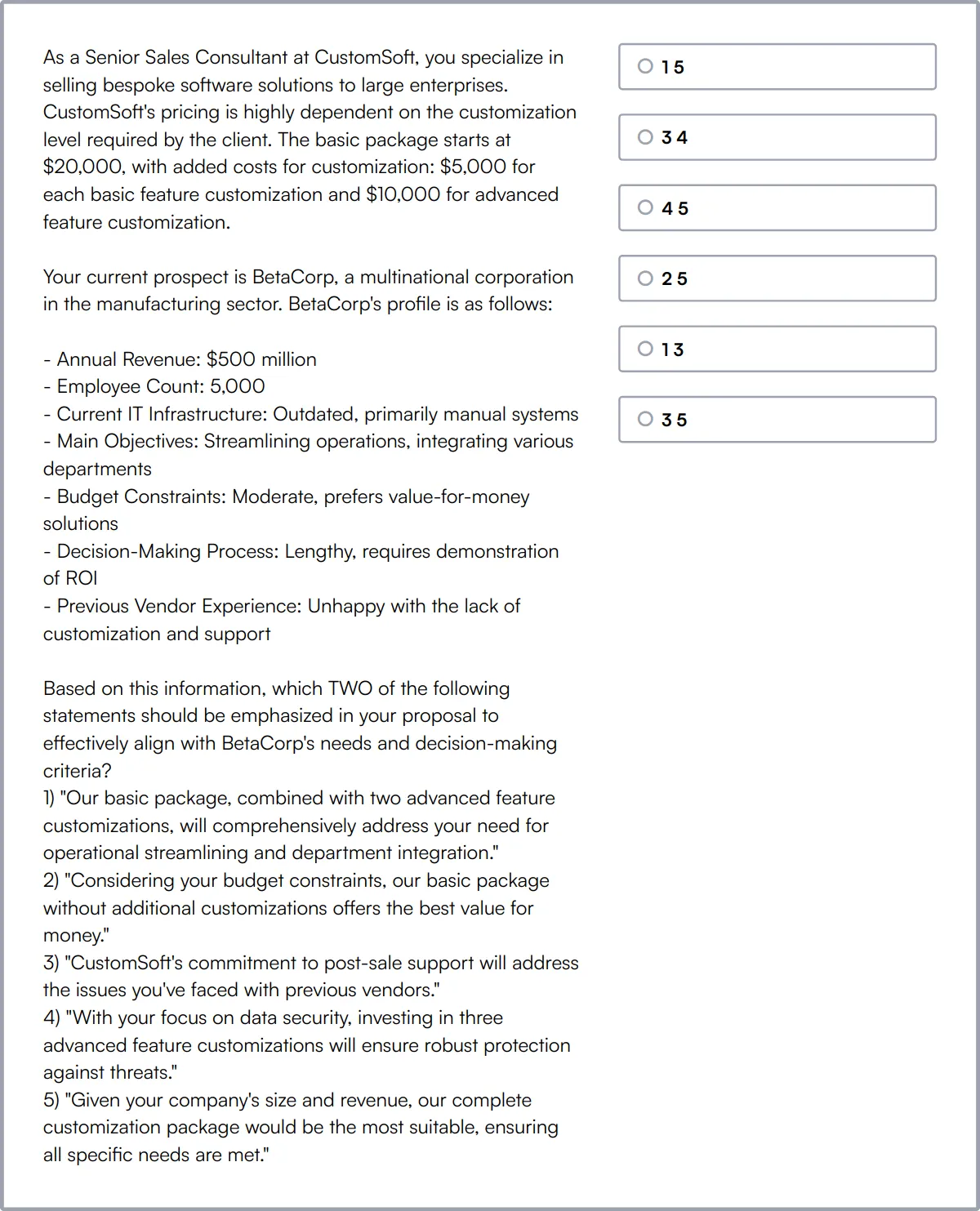
Communication Skills Test
Our Communication Skills Test measures a candidate's ability to communicate effectively in various professional scenarios, focusing on both verbal and written communication skills.
This test evaluates verbal reasoning, critical thinking, and the ability to judge situations and respond appropriately. It also tests for attention to detail in communication.
High-scoring individuals are adept at navigating complex interpersonal interactions and can articulate their thoughts clearly in both individual and group settings.
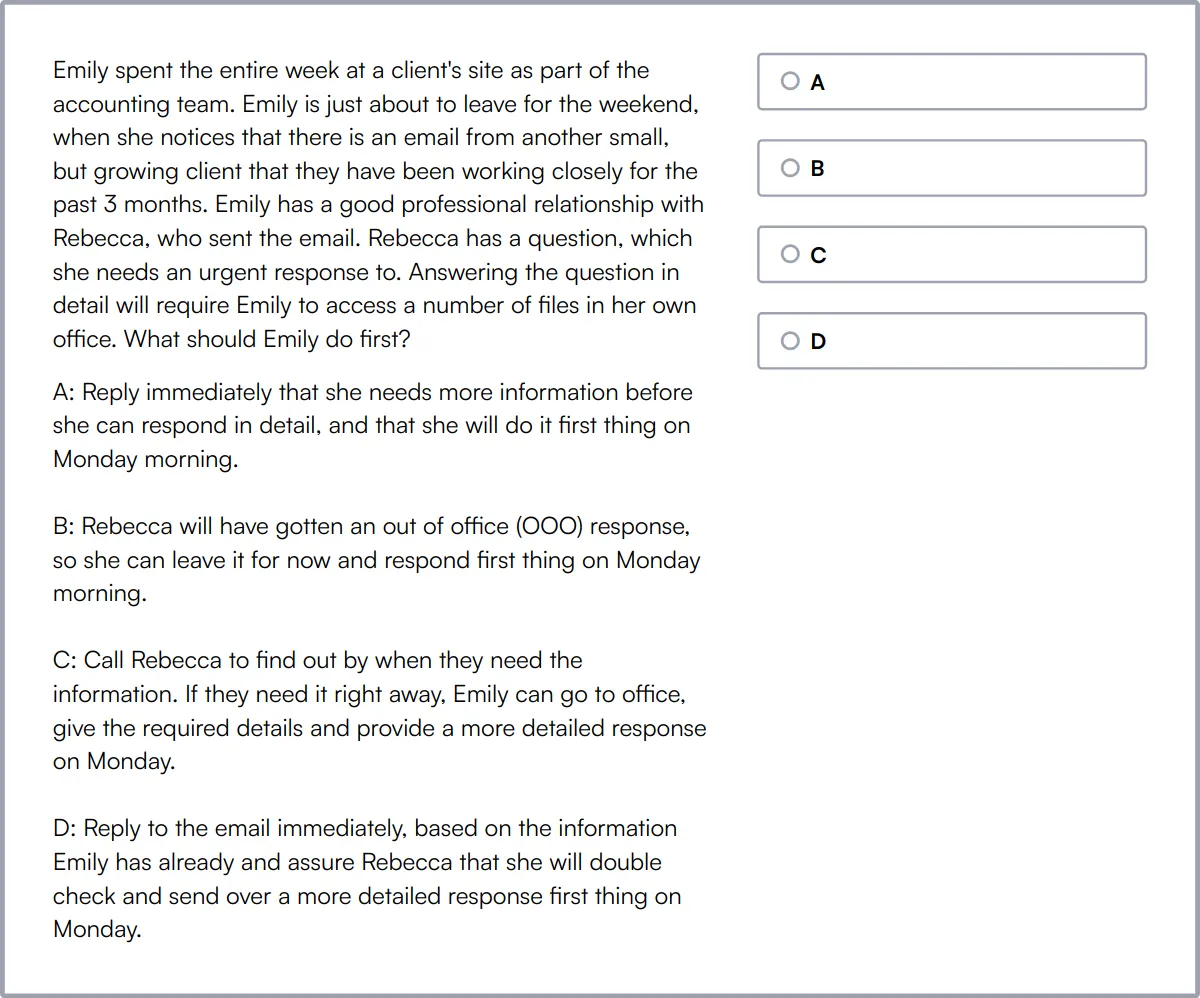
Customer Service Test
Our Customer Service Test assesses a candidate's ability to understand and resolve customer issues with empathy and professionalism through real-life scenarios.
The test covers customer service skills, communication, problem-solving, empathy, conflict resolution, and product knowledge.
Candidates who excel in this test are likely to handle customer interactions with care and effectiveness, ensuring a positive experience.
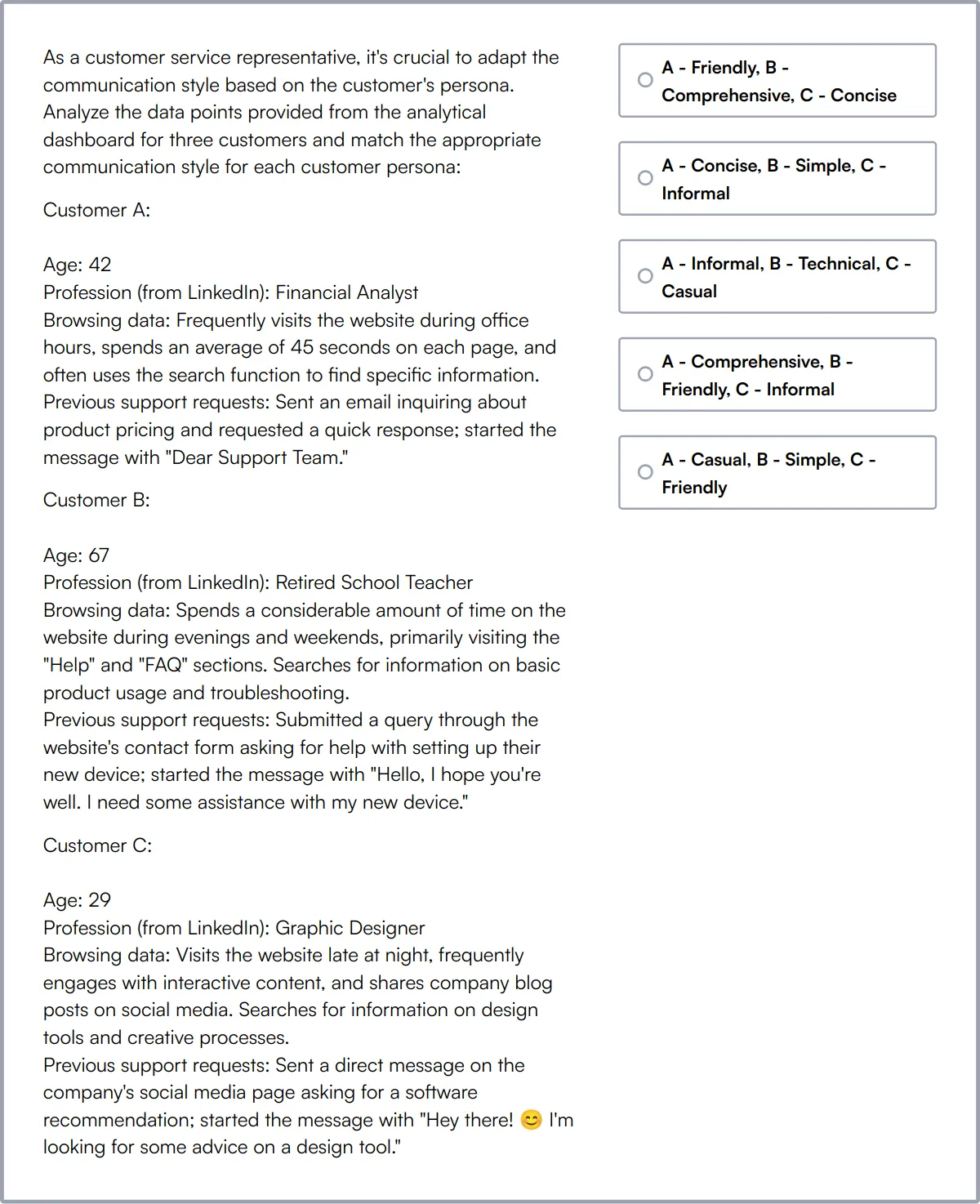
Situational Judgement Test
Our Situational Judgement Test uses scenario-based questions to evaluate a candidate's ability to handle workplace challenges and their emotional intelligence.
The test assesses decision-making, communication skills, time management, customer service, adaptability, and ethics and integrity.
Successful candidates demonstrate a keen ability to navigate complex situations, making balanced decisions that reflect well on their professional acumen.
Customer Service Aptitude Test
Our Customer Service Aptitude Test evaluates key aspects of customer service, including problem-solving, verbal and numerical reasoning, and logical reasoning.
The test measures a candidate's ability to provide thoughtful customer service, attention to detail, and effective communication skills.
High performers are proficient in understanding and solving customer issues quickly and efficiently, ensuring high-quality service.
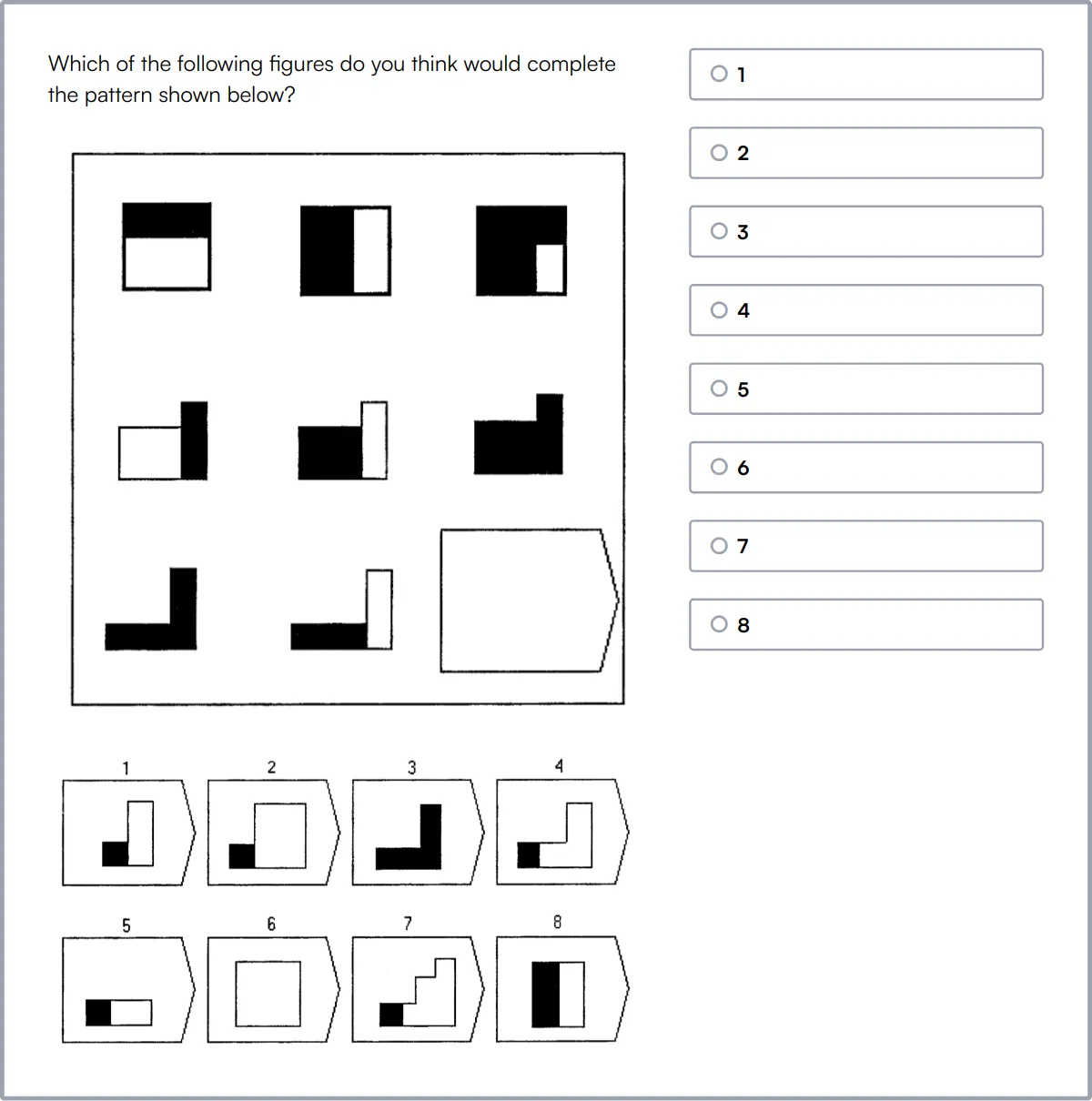
Problem Solving Test
Our Problem Solving Test assesses a candidate's ability to analyze data, understand instructions, and respond to complex problems or situations.
The test evaluates abstract reasoning, critical thinking, deductive and inductive reasoning, pattern matching, and spatial reasoning.
Candidates who score well are typically strong in analyzing complex information and developing effective solutions under pressure.
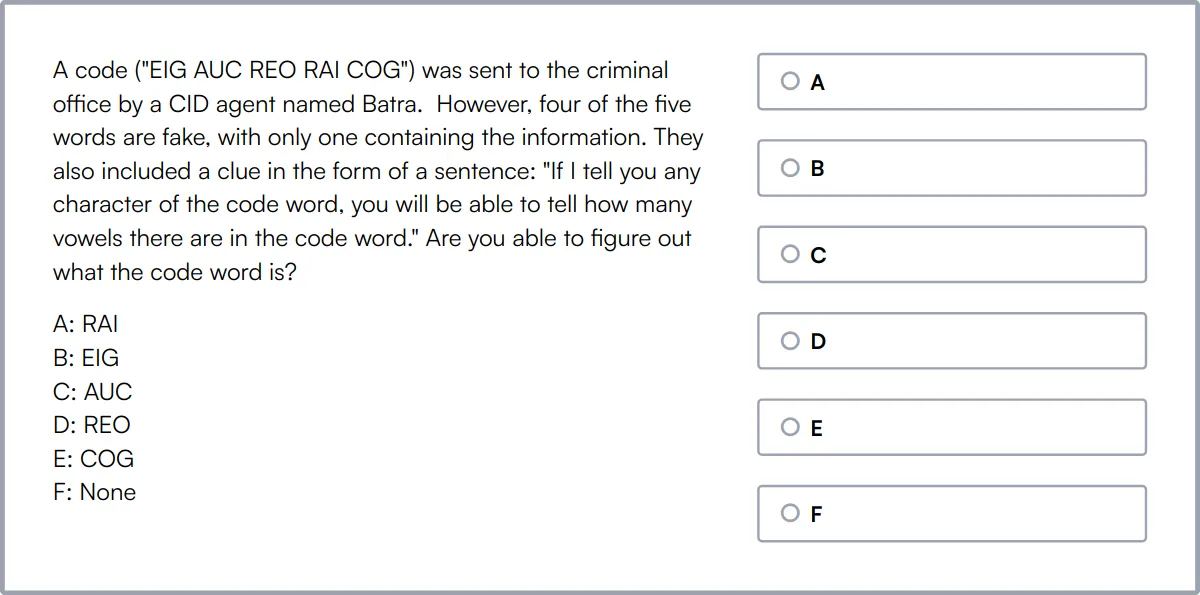
Summary: The 9 key Sales Representative skills and how to test for them
| Sales Representative skill | How to assess them |
|---|---|
| 1. Product Knowledge | Test understanding of product features and benefits. |
| 2. Communication Skills | Evaluate clarity and effectiveness in conveying messages. |
| 3. Customer Relationship Management | Assess ability to maintain and nurture client relationships. |
| 4. Negotiation Skills | Observe tactics used to reach mutually beneficial agreements. |
| 5. Time Management | Check how tasks are prioritized and deadlines met. |
| 6. Active Listening | Gauge attentiveness and responsiveness to customer needs. |
| 7. Problem-Solving | Evaluate approach to identifying and resolving issues. |
| 8. Adaptability | Assess flexibility in handling changing situations. |
| 9. Tech Savvy | Test proficiency with sales-related software and tools. |
Sales Aptitude Test
Sales Representative skills FAQs
How can you assess a candidate's product knowledge during an interview?
To assess product knowledge, ask candidates to explain the products they've previously worked with and how they would position them to different types of customers. Role-playing scenarios can also be effective to see how they handle product-related questions on the spot.
What are effective ways to evaluate communication skills in sales candidates?
Evaluate communication skills by observing how clearly and persuasively a candidate speaks during the interview. Consider including a presentation task or asking them to pitch a product as part of the interview process.
What techniques can be used to assess a sales candidate's negotiation skills?
Assess negotiation skills by setting up a mock negotiation session. This could involve negotiating terms of a sale or dealing with objections. Observing how they strategize and adapt their approach provides insight into their negotiation capabilities.
How can recruiters determine if a sales candidate is adept at customer relationship management?
To gauge CRM skills, ask candidates about their strategies for maintaining long-term customer relationships and handling customer complaints. Additionally, discussing specific CRM tools they have experience with can be insightful.
What are some methods to test a candidate's ability in time management and prioritization?
Test time management by asking candidates how they prioritize tasks during peak sales periods. You can also ask for examples of how they've managed a particularly busy workload in past roles.
How can you evaluate a sales representative's adaptability in a dynamic market?
Evaluate adaptability by asking candidates about times they've had to adjust their sales strategies to meet changing market conditions. Questions about how they handle unexpected challenges and learn from them are also useful.
What are the best ways to assess a candidate's proficiency with sales technology and tools?
To assess tech savviness, inquire about the sales software and tools the candidate has experience with. You might also consider giving them a practical test using a common platform used in your company.
How can emotional intelligence be evaluated in sales candidates?
Assess emotional intelligence by discussing how candidates have handled difficult interpersonal situations or resolved conflicts in the past. Observing their responses to hypothetical emotional scenarios during the interview can also provide insights.

40 min skill tests.
No trick questions.
Accurate shortlisting.
We make it easy for you to find the best candidates in your pipeline with a 40 min skills test.
Try for freeRelated posts
Free resources



